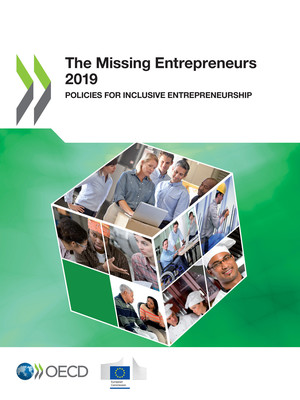copy the linklink copied!Preface by the OECD
Many people in OECD countries remain excluded from the labour market where wage inequality is rising. Entrepreneurship must be part of the solution. Entrepreneurs innovate, finding new solutions to social and economic problems, they identify and exploit growth opportunities, they provide jobs for themselves and others, and with good projects they generate good incomes. But for the full potential of entrepreneurship to be achieved for growth, innovation and inclusion, entrepreneurship needs to be a feasible opportunity for all people, whatever social group they come from, including those currently unemployed and inactive. Today this is not the case. The share of the population involved in entrepreneurship, and particularly entrepreneurship with innovation and growth prospects, is lower for many groups such as women, youth, migrants and the formerly unemployed, who tend to face greater barriers in areas such as skills, finance, networks and institutions. We need to break down the barriers to entrepreneurship for all populations, so that we can tap into the creativity, dynamism and innovation of more people.
Inclusive entrepreneurship policies can play an important role in giving more people the chance to be entrepreneurs and seek to support the creation of sustainable businesses by people belonging to groups that are under-represented in entrepreneurship. Reports such as the Missing Entrepreneurs have an important role in raising the profile of these challenges and advising governments on potential actions. The new Better Entrepreneurship Policy Tool (www.betterentrepreneurship.eu) goes even further by providing an interactive self-assessment exercise and learning materials for policy makers to help them strengthen the design and implementation of inclusive entrepreneurship policies.
This edition of the Missing Entrepreneurs includes updated data on the trends in self-employment and entrepreneurship activities by women, youth, seniors, the unemployed and immigrants. We can see that the composition of entrepreneurs in the European Union is changing, notably that more women are becoming self-employed. The number of self-employed women increased by 4.3% over the past decade whereas the number of self-employed men declined by 4.9%. Moreover, the self-employed population is aging in the European Union as the population ages. The number of self-employed seniors (50-64 years old) increased by nearly 20% between 2009 and 2018.
This report also looks at the potential for leveraging the opportunities created by digital transformation to increase the scope of entrepreneurship for these population groups. Digital transformation is having a growing impact on the daily operations of businesses and the self-employed, yet only 2% of SMEs in the European Union are taking full advantage of the digital economy. Policy makers are therefore exploring what can be done to help more entrepreneurs and SMEs leverage the potential of the digital economy, including tailored schemes to support entrepreneurs from under-represented and disadvantaged groups. Policy makers must monitor and evaluate these schemes so that we can learn about what works and what does not. The report also examines a related issue, business growth by entrepreneurs from population groups that are disadvantaged and under-represented in entrepreneurship. Businesses that transform into larger businesses are important for economies because they are responsible for a disproportionate share of job creation and innovation. While very few entrepreneurs are successful at achieving high-growth for their businesses, women, youth, seniors, immigrants and those starting from unemployment are even less likely to do so.
The OECD would like to thank the European Commission for their partnership on this important programme of work. Together we have built up an evidence base on entrepreneurship activities undertaken by people who face the greatest challenges in the labour market, and on the various policy approaches to facilitate inclusive entrepreneurship. We are committed to continue offering national, regional and local policy makers sound evidence and tools to design and implement effective inclusive entrepreneurship policies and programmes.

Lamia Kamal-Chaoui
Director,
Centre for Entrepreneurship, SMEs, Regions and Cities, OECD
Metadata, Legal and Rights
https://doi.org/10.1787/3ed84801-en
© OECD/European Union 2019
The use of this work, whether digital or print, is governed by the Terms and Conditions to be found at http://www.oecd.org/termsandconditions.


